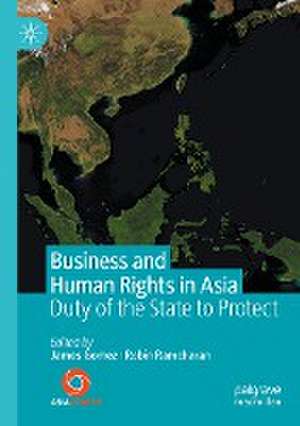Business and Human Rights in Asia: Duty of the State to Protect
Editat de James Gomez, Robin Ramcharanen Limba Engleză Paperback – 22 ian 2022
| Toate formatele și edițiile | Preț | Express |
|---|---|---|
| Paperback (1) | 780.37 lei 6-8 săpt. | |
| Springer Nature Singapore – 22 ian 2022 | 780.37 lei 6-8 săpt. | |
| Hardback (1) | 784.30 lei 6-8 săpt. | |
| Springer Nature Singapore – 22 ian 2021 | 784.30 lei 6-8 săpt. |
Preț: 780.37 lei
Preț vechi: 951.67 lei
-18% Nou
Puncte Express: 1171
Preț estimativ în valută:
149.33€ • 159.68$ • 124.50£
149.33€ • 159.68$ • 124.50£
Carte tipărită la comandă
Livrare economică 17 aprilie-01 mai
Preluare comenzi: 021 569.72.76
Specificații
ISBN-13: 9789811572753
ISBN-10: 9811572755
Ilustrații: XXV, 272 p. 3 illus.
Dimensiuni: 148 x 210 mm
Greutate: 0.4 kg
Ediția:1st ed. 2021
Editura: Springer Nature Singapore
Colecția Palgrave Macmillan
Locul publicării:Singapore, Singapore
ISBN-10: 9811572755
Ilustrații: XXV, 272 p. 3 illus.
Dimensiuni: 148 x 210 mm
Greutate: 0.4 kg
Ediția:1st ed. 2021
Editura: Springer Nature Singapore
Colecția Palgrave Macmillan
Locul publicării:Singapore, Singapore
Cuprins
1. Introduction—Business and Human Rights in Asia: Examining the Duty of the State to Protect.- 2. Does the Slipper Fit? National Action Plans on Business and Human Rights in South East Asia.- 3. National Action Plans on BHR: Norms, Procedures, Pitfalls.- 4. Multinational Corporations and Human Rights in Indonesia: The Need for Improvement in Legislation.- 5. All Carrots and No Stick: Human Rights Regulation of Companies in Japan.- 6. States’ Rights to Development of Natural Resources versus Indigenous People’s Rights: Resource Corporations and Free, Prior and Informed Consent.- 7. Effect of Minimum Wage on Employment Security: The Case of Precarious Workers in Myanmar.- 8. Recent Development on the Access to Remedy in Business and Human Rights in Indonesia.- 9. The Current State of Affairs for Access to Remedy for People and Communities Affected by Alleged Arbitrary Takings of Land in the Agribusiness Industry in ASEAN.- 10. As Smart Worlds Collide: Citizen Agency and Human Rights in the Smart City.- 11. Towards an Empirical Understanding of Ethical Consumption in Southeast Asia.- 12. Designing a Human Rights Management Systems Standard Framed By the Value Of Human Life: A Practical Approach to Business Enterprise Human Rights in Asia.- 13. Conclusion - Duty of the State To Protect: New Issues in the Post-COVID 19 Era.
Notă biografică
James Gomez is Regional Director, Asia Centre (Bangkok, Thailand and Johor Bahru, Malaysia), a not-for-profit organisation that seeks to create human rights impact in the region. Dr. Gomez is a communications and human rights specialist having served in different academic and leadership roles in the last 25 years, working for international NGOs, intergovernmental organizations, public and private universities, research institutes and think-tanks. He represents the Centre in media and public speaking engagements and builds relationships with key stakeholders around the world.
Robin Ramcharan is Executive Director, Asia Centre, Bangkok, Thailand. He specialises in human rights, intellectual property and security issues in Southeast Asia. Dr. Ramcharan is also Professor of International Relations with an extensive teaching and publications record. He has worked over the past two decades in the not-for-profit sector, the private sector, international organisations, and in research institutes and think-tanks. In Bangkok, Dr. Ramcharan represents the Centre in interaction with external partners and oversees the various research and publication projects.
Textul de pe ultima copertă
This book examines the State’s duty to protect human rights in Asia amidst rising concern over the human rights impact of business organisations in the region, a topic which has hitherto been understudied. It analyses a range of inter-connected issues: the advent of international standards, the UN Guiding Principles on Business and Human Rights, the challenges inherent in the formulation of National Action Plans on business and human rights, the need for improved legislation and policies, access to remedies, and conflicts with indigenous peoples over business activities. The book also covers innovative themes such as BHR in the era of smart cities, ethical consumer behavior, and a human rights management system, which are emerging areas of enquiry in this field concluding with a range of critical issues to be addressed, including the need for an assessment of COVID-19 pandemic’s impact on BHR in Asia and beyond. This book is part of Asia Centre’s exploration of the nascent regional human rights architecture that is facing significant obstacles in protecting human rights and showcases the progress achieved and the ongoing challenges across Asia.
James Gomez is Regional Director, Asia Centre (Bangkok, Thailand and Johor Bahru, Malaysia), a not-for-profit organisation that seeks to create human rights impact in the region. Dr. Gomez is a communications and human rights specialist having served in different academic and leadership roles in the last 25 years, working for international NGOs, intergovernmental organizations, public and private universities, research institutes and think-tanks. He represents the Centre in media and public speaking engagements and builds relationships with key stakeholders around the world.
Robin Ramcharan is Executive Director, Asia Centre, Bangkok, Thailand. He specialises in human rights, intellectual property and security issues in Southeast Asia. Dr. Ramcharan is also Professor of International Relations with an extensive teaching and publications record. He has worked over the past two decades in the not-for-profit sector, the private sector, international organisations, and in research institutes and think-tanks. In Bangkok, Dr. Ramcharan represents the Centre in interaction with external partners and oversees the various research and publication projects.
Caracteristici
Focuses on the duty of governments in Asia to uphold international human rights standards in relation to business activities in their jurisdictions Examines international norms on Business and Human Rights (BHR), as well as regional policies and practices Argues that while business organisations must ‘respect’ fundamental human rights, governments also have a duty to protect and to ensure that remedies are provided to victims Covers innovative topics such as the rights challenges amidst the construction of highly connected ‘smart cities’ and the place of ethical consumption
